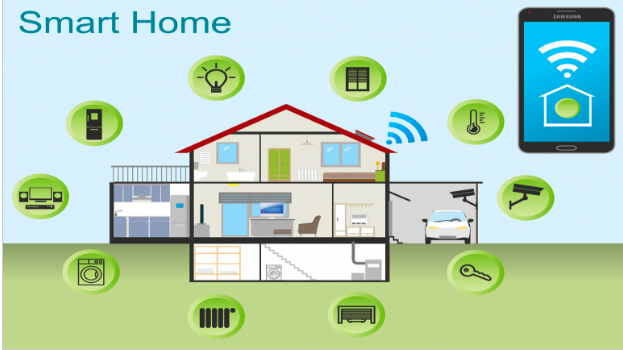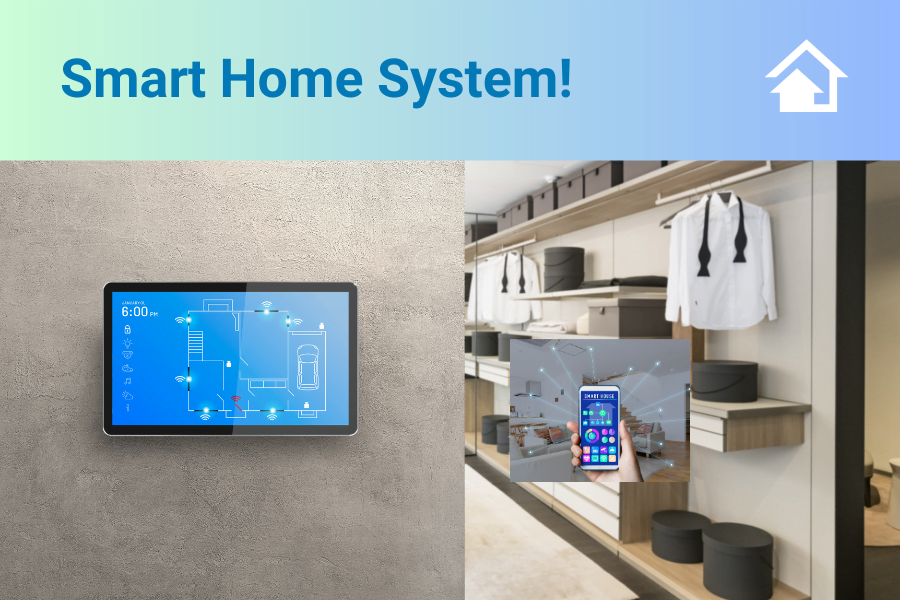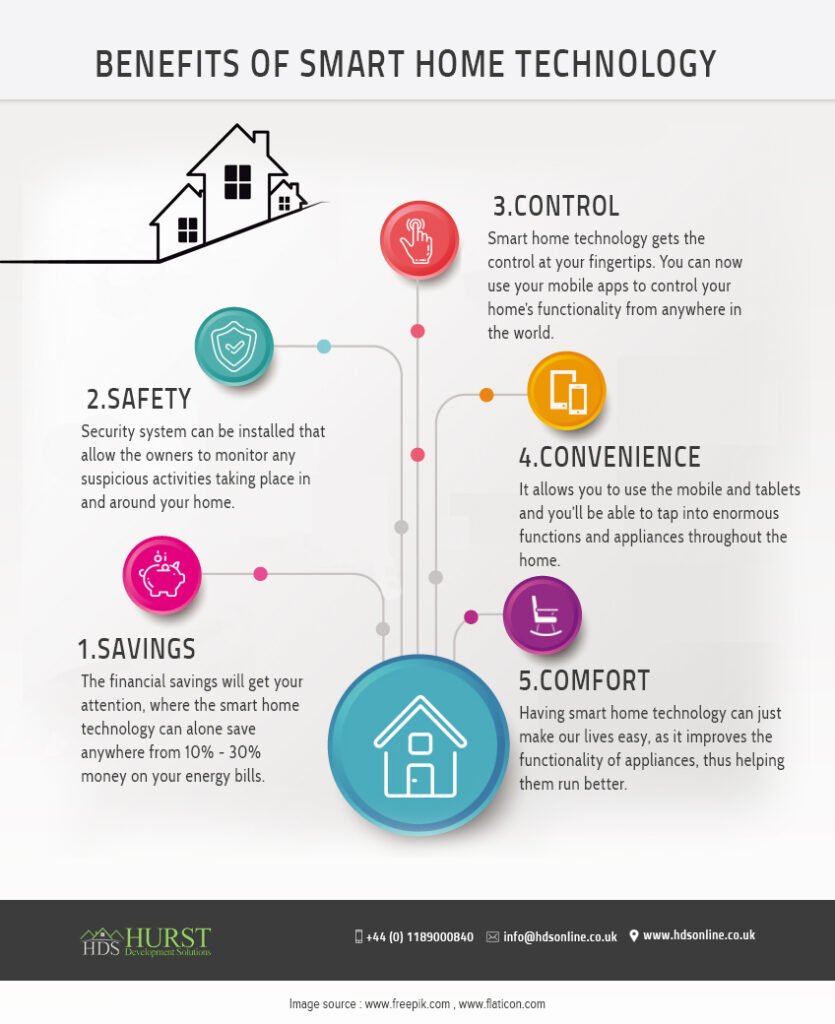
Imagine a world where your home responds and adapts to your needs, even before you voice them. Smart home devices have revolutionized the way we live, offering a seamless integration of technology into our everyday lives. From controlling your lights with a simple voice command to remotely monitoring your security system, the advantages of smart home devices are endless. They bring convenience, comfort, and security to a whole new level, making our lives easier and more enjoyable. In this article, we will explore the various benefits of using these innovative devices and how they can enhance your daily routine.
This image is property of storage.ning.com.
Convenience
Control from anywhere
With smart home devices, you can easily control various aspects of your home from anywhere. Whether you’re at work, on vacation, or simply in another room, you have the power to control your devices with just a few taps on your smartphone or a simple voice command. Forgot to turn off the lights before leaving the house? No problem. Want to preheat the oven while you’re on your way home? Easy. The convenience of controlling your home from anywhere not only saves you time and effort but also adds an extra layer of flexibility and convenience to your life.
Automation
One of the significant advantages of smart home devices is automation. By setting up various automation routines, you can simplify your daily tasks and make your home work for you. For example, you can create a routine that automatically turns on the lights and opens the blinds in the morning, so you wake up to a bright and welcoming space. You can also schedule your appliances to run when energy rates are cheaper, saving you money on your utility bills. With automation, you have the power to streamline your daily routines and create a more efficient and comfortable living environment.
Voice control
The rise of voice assistants like Amazon Alexa and Google Assistant has revolutionized the way we interact with technology, and smart home devices are no exception. With voice control, you can simply speak your commands, and your devices will respond accordingly. Want to dim the lights? Just say the word. Need to adjust the thermostat? Just ask. Voice control eliminates the need for physical interaction with your devices, allowing for a more intuitive and hands-free experience. It’s like having your very own personal assistant, ready to assist you with your daily tasks.
Centralized management
Gone are the days of juggling multiple apps and remotes to manage your smart home devices. With centralized management, you can easily control and monitor all your devices from a single interface. Whether it’s adjusting the temperature, checking security camera feeds, or scheduling automated routines, everything is conveniently accessible in one place. This not only simplifies the process of managing your devices but also provides a holistic view of your home, allowing for better control and coordination of all your smart home features.
Energy efficiency
Smart thermostats
Smart thermostats are a game-changer when it comes to energy efficiency. These intelligent devices learn your daily routine, adjust temperature settings according to occupancy, and even consider local weather forecasts to optimize energy usage. You no longer have to worry about forgetting to adjust the thermostat before leaving the house or coming home to a chilly or overheated space. Smart thermostats help reduce energy waste by ensuring that your home is always at the ideal temperature while maximizing energy efficiency.
Smart lighting
Gone are the days of manually switching on and off lights in every room. With smart lighting, you have complete control over your home’s lighting, allowing you to create the perfect ambiance for any occasion. Whether it’s dimming the lights for a cozy movie night or turning on the porch lights as you approach your driveway, smart lighting adds convenience and energy efficiency to your home. You can also set up schedules or motion sensors to automatically turn the lights on or off, reducing unnecessary energy consumption.
Energy monitoring
How much energy does your refrigerator consume? Are there any appliances that are using an excessive amount of energy? With energy monitoring, you can track your home’s energy usage and gain valuable insights into your consumption patterns. By identifying energy-hogging devices and making conscious choices about their usage, you can significantly reduce your energy bills. Energy monitoring not only promotes energy efficiency but also empowers you to make informed decisions about your energy consumption.
Optimized appliances
Smart home technology extends its energy efficiency benefits beyond lighting and thermostats. Many smart appliances, such as refrigerators, washing machines, and dishwashers, are designed to optimize energy usage. These appliances can intelligently adjust their operation based on factors like load size, time of day, and energy rates. By leveraging smart technology, these appliances can reduce wastage and operate at their highest efficiency levels, ultimately saving energy, money, and contributing positively to the environment.
Security
Smart locks
Say goodbye to fumbling with keys or worrying about lost copies. Smart locks provide a secure and convenient way to lock and unlock your home. With features like keyless entry and remote access, you can control your locks from anywhere using your smartphone or voice commands. Whether you want to let in a guest, grant access to a service provider, or simply check if the doors are locked, smart locks offer peace of mind and enhanced security.
Smart cameras
Keep an eye on your home even when you’re away with the help of smart cameras. These devices provide real-time video monitoring and recording capabilities, allowing you to visually check on your property remotely. Whether it’s monitoring the front porch for package deliveries or keeping an eye on your pet while you’re at work, smart cameras offer a sense of security and the ability to stay connected to your home, no matter where you are.
Motion sensors
Motion sensors are a key component of any smart security system. These sensors can detect movement and trigger automated actions, such as turning on lights, sounding an alarm, or sending alerts to your phone. With motion sensors strategically placed throughout your home, you can ensure that any unusual activity is promptly detected and responded to, enhancing the security of your property.
Remote monitoring
Smart home security systems allow for remote monitoring, giving you the ability to keep tabs on your home’s security from anywhere in the world. Whether you’re on vacation, at work, or simply out running errands, you can receive real-time notifications and access live camera feeds to stay updated on the status of your home. Remote monitoring offers peace of mind, knowing that you can always stay connected and informed about the security of your home.
Safety
Fire and carbon monoxide detection
A smart home is a safer home when it comes to fire and carbon monoxide detection. Smart smoke and carbon monoxide detectors are equipped with advanced sensors and interconnected capabilities, ensuring that you’re alerted to any potential dangers immediately. These devices can also send notifications to your smartphone, allowing you to respond promptly, even when you’re not at home. With smart detection systems in place, you can have peace of mind knowing that you and your loved ones are protected from potential hazards.
Water leak detection
Water leaks and flooding can cause significant damage and costly repairs. Smart water leak detectors are designed to detect leaks and floods early, providing you with an early warning to take action. These devices can send alerts to your smartphone, allowing you to address the issue before it escalates. By detecting leaks early, you can minimize damage, save money on repairs, and protect your home from potential water-related disasters.
Emergency notifications
In times of emergencies, every second counts. Smart home devices can be programmed to send emergency notifications to your smartphone, ensuring that you’re alerted to any critical situations immediately. Whether it’s a fire, a break-in, or a medical emergency, these notifications can help you take quick action or contact the appropriate authorities. By providing prompt alerts, smart home devices contribute to your safety and the security of your loved ones.
Smart doorbells
Smart doorbells offer an added layer of safety and convenience to your home. With built-in cameras, motion sensors, and two-way audio, you can see and communicate with anyone at your doorstep, even when you’re not at home. Whether it’s a delivery person, a stranger, or a friend, you have the ability to monitor and interact with visitors remotely, enhancing your home’s security and ensuring that you’re always connected to what’s happening outside your door.
This image is property of miro.medium.com.
Cost savings
Energy savings
One of the most significant benefits of smart home devices is the potential for energy savings. By optimizing energy usage through automated routines, smart thermostats, and energy monitoring, you can reduce your utility bills significantly. The ability to control your devices remotely also allows you to ensure that unnecessary energy consumption is minimized. Through energy savings, smart home devices not only reduce your ecological footprint but also save you money in the long run.
Reduce water wastage
With smart water leak detectors and efficient appliances, smart home devices can help reduce water wastage. By detecting leaks early and allowing for prompt repairs, smart water leak detectors prevent water wastage and contribute to water conservation efforts. Additionally, smart appliances, such as dishwashers and washing machines, are designed to optimize water usage, ensuring that you don’t use more water than necessary. Through water conservation, smart home devices help you save money on water bills while protecting our valuable natural resource.
Smart appliances
Smart appliances play a significant role in reducing costs. By optimizing their operation based on factors like load size, energy rates, and usage patterns, smart appliances can minimize energy and water wastage, ultimately reducing your utility bills. Smart refrigerators, for example, can adjust their cooling settings based on the contents inside, reducing energy consumption. Similarly, smart washing machines and dishwashers can determine the appropriate water levels and cycle lengths for each load, saving both water and energy. With smart appliances, you can enjoy the convenience of cutting-edge technology while saving money and promoting sustainability.
Home insurance discounts
Many insurance providers recognize the benefits of smart home devices in enhancing safety and security. As a result, they often offer discounts on home insurance premiums for homeowners with smart devices installed. By investing in smart home technology, you not only gain the advantages of convenience, security, and energy efficiency but also enjoy potential savings on your insurance costs. Smart home devices contribute to a safer and more secure living environment, reducing the likelihood of accidents or incidents that may result in insurance claims.
Comfort and ambiance
Smart thermostats
Smart thermostats not only contribute to energy efficiency but also enhance comfort and ambiance in your home. You can set customized temperature settings for different times of the day, ensuring that your home is always at the optimal temperature to suit your preferences. Whether you prefer a cozy warmth during the winter or a cool retreat from the summer heat, smart thermostats allow you to create the perfect atmosphere with ease. Additionally, with voice control or automation, you can adjust your thermostat without getting up from your comfortable spot, adding an extra layer of convenience to your home.
Smart lighting
The right lighting can transform the ambiance of a space, and smart lighting allows you to create the perfect atmosphere for any occasion. With customizable settings and the ability to control individual lights or groups of lights, you can easily set the mood for relaxation, productivity, or entertainment. Whether it’s dimming the lights for a romantic date night or choosing vibrant colors for a party, smart lighting puts you in control of the ambience, enhancing your overall comfort and enjoyment of your living spaces.
Customized settings
One of the great advantages of smart home devices is the ability to customize your settings to fit your preferences. From personalized temperature settings on your thermostat to customized lighting scenes, you have the power to create a living environment that is uniquely tailored to your needs. You can set specific routines or schedules that align with your daily activities, ensuring that your home adapts to your lifestyle effortlessly. With customized settings, your home becomes an extension of yourself, adding a personal touch to your living spaces.
Smart blinds and curtains
Controlling the amount of natural light that enters your home is essential for both comfort and energy efficiency. With smart blinds and curtains, you can easily adjust the level of sunlight and privacy with just a few taps on your smartphone or a simple voice command. Want to wake up to natural light streaming in through your bedroom window? No problem. Need to block out the harsh afternoon sun for a cozy movie night? Easily done. Smart blinds and curtains allow you to effortlessly control the ambiance in your home, optimizing both comfort and energy usage.

This image is property of hometriangle.com.
Remote monitoring and control
Surveillance
Remote monitoring of your home’s security cameras allows you to stay connected and keep an eye on your property no matter where you are. Whether you’re at work, on vacation, or simply out running errands, you can access live camera feeds and receive real-time notifications if any suspicious activity is detected. Remote surveillance adds a layer of security, giving you peace of mind and ensuring that you’re always in control of your home’s safety.
Appliance and device control
Whether it’s adjusting the thermostat, turning on/off lights, or starting the washing machine, remote control of your appliances and devices allows you to manage your home’s functionality from anywhere. With just a few taps on your smartphone or a simple voice command, you can ensure that your home is running smoothly even when you’re not physically present. Remote control provides convenience, flexibility, and peace of mind, knowing that you can manage your home’s devices with ease.
Home automation
Home automation takes remote monitoring and control to the next level by allowing you to set up customized routines and schedules for your devices. With automated routines, you can program your home to adjust lighting, temperature, and other devices based on your daily activities. For example, you can have your lights turn on automatically at sunset or have your thermostat adjust to an energy-saving temperature when you leave the house. Home automation simplifies your daily routines, making your home work for you and enhancing your overall comfort and efficiency.
Peace of mind
One of the most significant benefits of remote monitoring and control is the peace of mind it provides. Whether you’re away on vacation, at work, or simply out for the day, knowing that you can keep tabs on your home and manage your devices remotely offers a sense of security and reassurance. You can check if you locked the doors, view live camera feeds, or receive notifications if any unexpected activity is detected. Remote monitoring and control allow you to be in control of your home and provide you with the peace of mind you deserve.
Improved accessibility
Assistive technology
Smart home devices have made significant advancements in terms of accessibility for individuals with disabilities or limited mobility. From voice control to automated routines, these devices can be a game-changer for those who require assistance in managing daily tasks. Voice assistants like Amazon Alexa or Google Assistant allow individuals to control their devices and perform various functions through simple voice commands. This accessibility not only promotes independence but also enhances the overall quality of life for individuals who may face challenges related to physical mobility or other disabilities.
Remote access
Remote access is a crucial aspect of improved accessibility. With the ability to control and monitor your home from anywhere, you can stay connected and manage your devices even if you’re not physically present. This is particularly beneficial for individuals who may have difficulty moving around or those who are frequently away from home. Remote access ensures that accessibility is not limited by physical proximity and allows individuals to stay connected to their home and manage their devices with ease.
Voice control
Voice control is a game-changer for individuals with disabilities who may find it challenging to operate buttons or switches. With voice assistants and voice commands, individuals can control their devices, adjust settings, and perform various functions using just their voice. This technology enables individuals to interact with their smart home devices in a natural and intuitive way, promoting accessibility and inclusivity for all.
Smart doorbells and cameras
Smart doorbells and cameras provide added accessibility for individuals who may have difficulty moving around or answering the door. With two-way audio and video capabilities, these devices allow individuals to communicate with visitors remotely, granting access or screening for potential threats. Smart doorbells and cameras enhance accessibility by allowing individuals to see and interact with anyone at their doorstep without needing to physically approach the door, adding an extra layer of convenience and security.

This image is property of eskayh.com.
Integration and compatibility
Smart home ecosystems
Smart home devices come from a variety of manufacturers, each with their own protocols and technologies. However, many devices can now seamlessly integrate into a smart home ecosystem, allowing for unified control and coordination. These ecosystems, such as Apple HomeKit and Samsung SmartThings, provide a central hub or platform that enables devices from different brands to work together harmoniously. Integration among devices ensures that you can control and manage your entire smart home from a single interface, regardless of brand or technology.
Interconnectivity
Interconnectivity is a key aspect of smart home devices, allowing them to work together and exchange information. For example, a motion sensor can trigger the lights to turn on or the security cameras to start recording. By interconnecting devices and creating automation routines, you can create a smart home system that is efficient, responsive, and tailored to your needs. Interconnectivity ensures that your devices work in harmony, providing you with a seamless and integrated smart home experience.
Cross-platform compatibility
Cross-platform compatibility is essential for users who may have devices from various manufacturers or utilize different personal assistants. Smart home devices are designed to be compatible with various platforms, such as Apple HomeKit, Google Assistant, or Amazon Alexa. This means that, regardless of the platform you choose or the devices you own, you can enjoy a cohesive and integrated smart home experience. Cross-platform compatibility ensures that you have the freedom to choose the devices and platforms that suit your preferences while still enjoying a well-connected and interoperable smart home system.
Integration with personal assistants
Personal assistants, such as Amazon Alexa, Google Assistant, or Apple Siri, play a crucial role in the integration and control of smart home devices. These assistants act as the central hub, allowing you to control and manage your devices using voice commands or through dedicated apps. By integrating with personal assistants, smart home devices become easily accessible with just a few words, simplifying the control and coordination of your smart home system.
Data collection and analysis
Usage statistics
Smart home devices collect valuable usage statistics that can help you make informed decisions about your home and devices. From energy consumption data to usage patterns, these statistics provide insights into how you use your home and can guide you in optimizing your routines and devices for maximum efficiency and comfort. By analyzing usage statistics, you can identify trends, make adjustments, and improve the overall performance and efficiency of your smart home.
Behavior tracking
Behavior tracking is another aspect of data collection that can prove useful in understanding your habits and preferences. Smart home devices can learn your daily routines, patterns of usage, and adjust settings accordingly to provide you with a personalized and tailored experience. For example, a smart thermostat can learn when you wake up and adjust the temperature accordingly, ensuring that you step into a comfortable environment. Behavior tracking allows your smart home devices to adapt to your needs, providing you with a more intuitive and seamless living experience.
Predictive analytics
Building upon usage statistics and behavior tracking, smart home devices can leverage predictive analytics to anticipate your needs and preferences. By analyzing historical data and patterns, these devices can predict future actions and adjust settings in advance. For example, a smart lighting system can anticipate when you usually return home in the evening and ensure that the lights are on before you arrive. Predictive analytics make your smart home system more proactive, saving you time and improving your overall experience.
Efficiency improvements
With the data collected by smart home devices, you can identify areas for improvement and optimize your home’s efficiency. By understanding your energy consumption patterns, inefficiencies can be identified, such as high energy usage during certain times of the day. Armed with this knowledge, you can make informed decisions about when and how to use your devices, ultimately reducing wastage and saving on energy costs. Data collection and analysis enable you to continually refine and improve the performance of your smart home, ensuring that it operates at its highest efficiency levels.

This image is property of hdsonline.co.uk.





